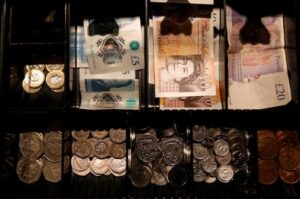By Arathy Somasekhar and Jeslyn Lerh
SINGAPORE (Reuters) -Oil prices extended gains from the previous session on Thursday, buoyed by a bigger-than-expected decline last week in crude stockpiles in the United States, the world’s largest oil consumer.
Brent futures rose 32 cents, or 0.4%, to $85.40 a barrel by 0340 GMT, while U.S. West Texas Intermediate (WTI) crude gained 48 cents, or 0.6%, to $83.33.
Both contracts settled higher on Wednesday.
U.S. crude inventories fell by 4.9 million barrels last week, the latest data from the U.S. Energy Information Administration showed. That exceeds a decline of 30,000 barrels forecast by analysts in a Reuters poll and a drop of 4.4 million barrels in a report from the American Petroleum Institute trade group. [EIA/S] [API/S]
“Healthy demand signals from the U.S. outweighs concerns from modest Chinese growth last week,” said Priyanka Sachdeva, senior market analyst at Phillip Nova.
“Hopes of a Fed easing, which can boost economic growth, and current summer travel in the U.S. are ensuring enough traction in oil demand from the world’s largest economy,” Sachdeva said.
The prospects of cuts in interest rates in coming months in the both the U.S. and Europe helped to support the market.
Federal Reserve officials said on Wednesday the U.S. central bank is “closer” to cutting interest rates given inflation’s improved trajectory and a labour market in better balance, possibly setting the stage for a reduction in borrowing costs in September.
Also, U.S. economic activity expanded at a slight to modest pace from late May through early July with firms expecting slower growth ahead.
The European Central Bank, meanwhile, is all but certain to keep interest rates unchanged on Thursday, but signalled that its next move is likely to be a cut.
Investors are also awaiting policy news from a key leadership gathering in China that is to end on Thursday.
The dollar eased on Thursday for a third straight session. A weaker dollar can boost demand for oil by making greenback-denominated commodities like oil cheaper for holders of other currencies.
(Reporting by Arathy Somasekhar in Houston and Jeslyn Lerh in Singapore; Editing by Tom Hogue)





